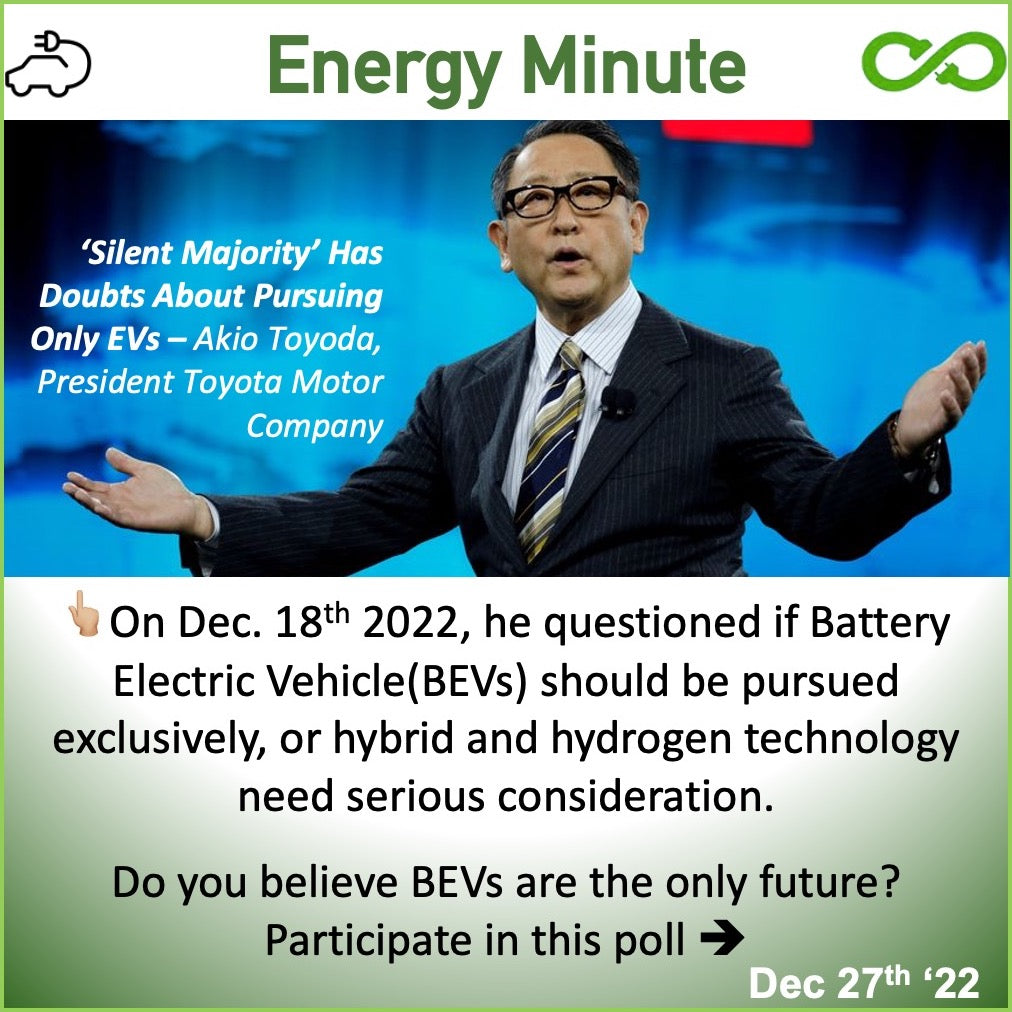
Are Battery Electric Vehicles (BEV) only alternative for transport we must pursue?
Share
Should we lean on the future of transportation to be only Battery Electric Vehicle (BEV)
Why not EV?
Electric vehicles (EVs) have gained a lot of attention in recent years as a potential solution to reducing greenhouse gas emissions from the transportation sector. Many companies, governments, and individuals have embraced EVs as the way of the future, believing that they are the key to a more sustainable and environmentally responsible transportation system.
The Value
There is no denying that EVs have the potential to significantly reduce emissions from the transportation sector, which is a major contributor to climate change. According to the International Energy Agency, transportation accounts for about a quarter of global energy-related greenhouse gas emissions, with road transportation being the largest contributor.
The switch to EVs can help reduce these emissions by replacing fossil fuel-powered vehicles with ones that run on electricity. EVs produce zero tailpipe emissions and can significantly reduce the carbon footprint of transportation.
The Pitfalls
However, the shift to EVs is not without its challenges. Recently, Toyota's President Akio Toyoda emphasized the need to consider a range of transportation technologies, including hybrid and hydrogen options, rather than solely relying on battery electric vehicles (BEVs). He pointed out several important considerations that are often overlooked in the push for EVs.
One of the main considerations is the resources required for battery production. Batteries are a crucial component of EVs, as they store the electricity that powers the vehicle. However, the production of batteries requires a significant amount of resources, including lithium and cobalt. While efforts are being made to reduce the environmental impact of lithium mining, it is still a concern. Lithium mining can lead to deforestation and water pollution, and the demand for lithium is expected to increase as the demand for EVs grows.
Charging Infrastructure
Another consideration is the availability of charging infrastructure, particularly in rural areas. While cities and urban areas may have a robust network of charging stations, rural communities often do not have the same level of access. This can make it difficult for people living in these areas to fully embrace EVs as their primary mode of transportation.
Cold Weather
In addition, the challenges of operating EVs in cold weather should not be underestimated. The range of most EVs is significantly reduced in cold temperatures, which can be a major inconvenience for drivers who live in colder climates. Additionally, the performance of the batteries can suffer in extreme cold, leading to reduced efficiency and longer charging times.
It's important to recognize that while EVs have the potential to play a significant role in reducing greenhouse gas emissions, they may not be the best solution for everyone. For those living in urban areas with access to a lot of charging infrastructure, EVs may be a good fit. Similarly, for those who have charging options at home and relatively short commutes, EVs may be a good choice.
However, for those living in rural areas with limited access to charging infrastructure, or for those who need a vehicle with a longer range, EVs may not be the most practical solution. In these cases, hybrid or hydrogen fuel cell vehicles may be a better fit.
Hybrid Vehicles
Hybrid vehicles, which combine a traditional internal combustion engine with an electric motor, offer a more flexible and adaptable solution. They can run on either electricity or gasoline, depending on the needs of the driver and the driving conditions. This makes them a good option for people who need a vehicle that can handle long trips or extreme weather conditions.
Hydrogen based transportation
Hydrogen fuel cell vehicles, on the other hand, offer a completely different approach to electrification. Rather than using a battery to store electricity, these vehicles use a fuel cell to generate electricity on demand. This means that they have a much longer range and can be refuelled much more quickly than EVs.
While hydrogen fuel cell technology is still in its early stages, it has the potential to play a significant role in the future of transportation. The main challenge with this technology is the availability of hydrogen fuel, which is still relatively scarce. However, as production and distribution infrastructure improves, hydrogen fuel cell vehicles could become a more viable option for consumers.
Conclusion
In conclusion, it's important to consider a range of transportation technologies when thinking about the future of transportation and reducing greenhouse gas emissions. EVs are certainly a promising option, but they are not the only solution. Hybrid and hydrogen fuel cell vehicles also have a role to play in this transition. By considering all options and not putting all our eggs in one basket, we can work towards a more sustainable and environmentally responsible transportation sector.

2 comments
Ev is the future of upcoming transportation. The really nice article covered a lot of amazing things.
Ev is the future of upcoming transportation. The really nice article covered a lot of amazing things.